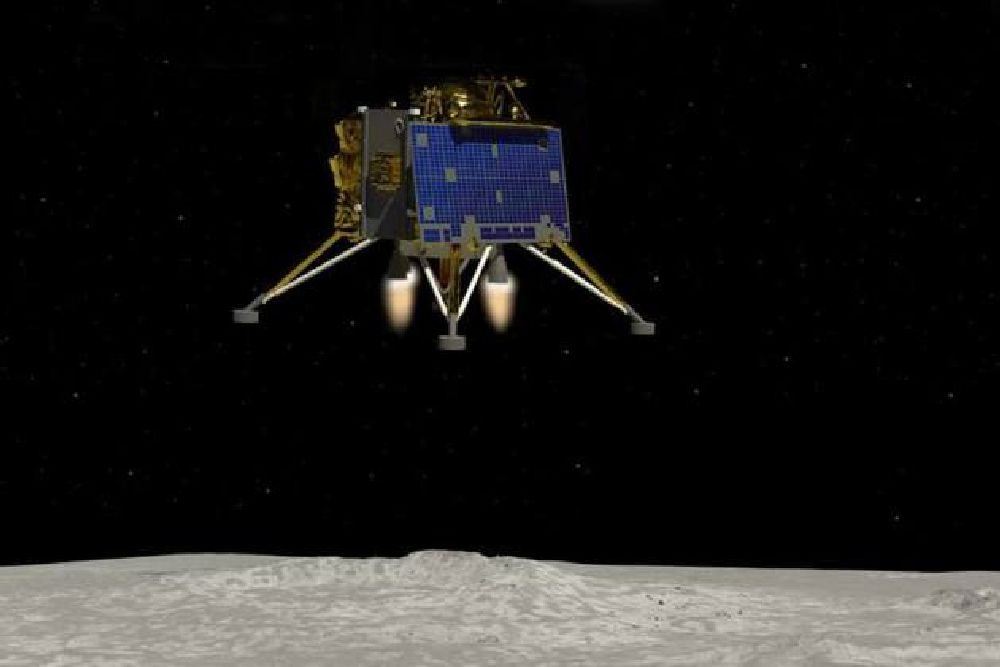
By Anjan Roy
Now that India has soft landed on the south pole of moon, the dust it will raise will travel from moon surface to the earth.
The landing of a rover vehicle will kick up lot of moon dust —called regolith for its typical characteristics— which is minute and sticky and will cover the entire lander for a while which will is expected to cut off communications for some time.. Only after the dust subsides, will the moon rover roll out from the lander and start its movement across the surface after a while.
The fact is that only four nations have so far been able to soft land on the moon itself bears testimony that this is not an easy achievement. Were it so, many others would by now have landed there.
By placing its rover on the moon and conducting scientific experiments, India immediately gains recognition as a space super power. In fact, many of the global media is referring to India as such. This is a major recognition. There are larger implications of this achievement.
India’s successful landing on moon surface, more particularly after the failure of Russian landing bid just couple of days back, puts India on a geo-political plane which would be vastly changed. It gives some clear diplomatic gains and prestige which are multi-dimensional.
India is only the fourth country in the world to put its lander on the moon, that too in an area which is of critical scientific importance. The Vikram lander has arrived at the lunar south pole where sunlight does not reach mostly. So it is surmised if moon has water, it would be in the form of ice particles in the southern polar region.
The technical success in the lunar arrival vests a kind of geo-political hue on the country. India had earlier signed up to the American Artemis programme, which seeks to create a regime for moon research and lunar governance for the future.
This assumes importance as a host of countries are seeking to land on the moon in the immediate future. These include, Israel, Japan, and the traditional space powers, including China, America and Russia. Until now, the United Nations had resolved that no one country can claim exclusive national sovereign claim on any part of the moon.
China, joined by Russia, have however not joined any of the international efforts for governance of moon research and territorial rights. If anything, China has refused to fall in line with the international position on no national claims on the moon.
India on the other hand is in tune with the current international doctrine disallowing national territorial claims and as a vindication joined the Artemis programme for joint explorations and non-national ownership of any part of moon.
The space, willy-nilly, is fast becoming an extended stage of rivalry among the major earth powers. Russia, in its fallen status, has aligned fully with China as the latter had displayed its capabilities by making three landings and more particularly on the other side of the moon which is not visible to earth bound observers.
The US, on the other hand, although had placed its astronauts on the moon half a century ago, has not undertaken much activity recently. The only other country which had placed its rovers in the twenty-first century is China.
In the situation, American agreements on moon research and exploration with India is a strategic achievement. India would be a valuable resource for America’s renewed moon exploration bid. In this joint effort, several other democracies, like Canada, Japan and South Korea, are also joining in.
That means, you have the newly emerging geo-political alignment — the so-called democracies, on the one hand, with the authoritarians on the other.
Because of Chinese behaviour on the Himalayan borders, India firmly remains outside of any joint effort with China. India is on the other side with America and the west in space related activities.
The lunar landing has happened at a critically favourable time as well when the BRICS summit is being held in South Africa. Already, Prime Minister, Narendra Modi, had pitched the achievement as not just of India but for humanity at large.
India will have a far higher profile at the BRICS summit now that the space capability has been so acutely demonstrated with the picture perfect landing. China’s preponderance as the final space power would be challenged and the global south nations will take India so much seriously.
This achievement will give boost to India’s hard technological image, as well as, its soft power influence over the global south. Prime Minister Narendra Modi has already sought to capitalise on it by proposing a broader BRICS-level space initiative. These are diplomatic gains apart from the sheer scientific achievements of the whole endeavour. These are no less important in the life of a nation.
Simply put, India now stands much taller in the comity of nations than when the lander was making its still critical descent on moon surface. One wrong move from mission could have changed all that. (IPA Service)
The post After Soft Landing On Moon, India Has Now Better Bargaining Power In Space Diplomacy first appeared on Latest India news, analysis and reports on IPA Newspack.


